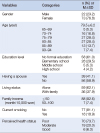Abstract
Purpose
Cancer continues to be a life-threatening disease and is a preventable disease. To improve cancer preventive behaviors is important to control cancer among older rural adults who are isolated from major health care services. The purpose of this study was to identify the degrees of health literacy, cancer knowledge, and cancer preventive behaviors and to explore the impact of health literacy and cancer knowledge on cancer preventive behaviors among older rural adults.
Methods
A cross-sectional correlational study was used to examine a total of 95 older community-dwelling adults. Data were collected between June and October, 2016 with a convenience sample in rural areas located in U city.
Results
Multiple regression analysis revealed that 33.7% of the variance in cancer preventive behaviors was explained by health literacy and cancer knowledge. Health literacy and cancer knowledge were significant predictors of cancer preventive behaviors.
Conclusion
Among older rural adults, inadequate health literacy and low cancer knowledge predicted lower cancer preventive behaviors. A better understanding about older rural adults with poor health literacy and cancer knowledge could facilitate the development of intervention strategies to reduce health inequalities.
Figures and Tables
Table 1
General Characteristics (N=95)

Table 2
Score of Health Literacy, Cancer Knowledge, and Cancer Preventive Behaviors (N=95)

| Variables | Possible range | Min. | Max. | M±SD | % of correct answer |
|---|---|---|---|---|---|
| Health literacy | 16~80 | 18 | 66 | 38.6±10.9 | |
| Cancer knowledge | 0~20 | 0 | 17 | 7.43±5.96 | 37.2 |
| Cancer preventive behaviors | 20~100 | 26 | 89 | 51.9±10.1 |
Table 3
Difference of Health Literacy, Cancer Knowledge, and Cancer Preventive Behaviors by Characteristics (N=95)

References
1. Statistics Korea. 2015 Elderly statistics. Accessed November 23, 2016. http://kostat.go.kr/portal/korea/kor_nw/2/1/index.board?bmode=read&aSeq=348565.
2. Statistics Korea. 2014 Agriculture, fishery, forestry research result. Accessed November 23, 2016. http://kostat.go.kr/portal/korea/kor_nw/2/1/index.board?bmode=read&aSeq=335130.
3. Nonghyup-Economic Research Institute. 2012-31 NHERI Weekly brief. Accessed November 23, 2016. http://www.nonghyup.com/Upload/Images/Data/635756859560990045.pdf.
4. World Health Organization. Cancer prevention. Accessed November 23, 2016. http://www.who.int/cancer/prevention/en/.
5. Schloman BF. Health literacy: a key ingredient for managing personal health. Online J Issues Nurs. 2004; 9(2):6.
6. Nielsen-Bohlman L, Panzer AM, Kindig DA, editors. Health literacy: a prescription to end confusion. Washington: National Academy Press;2004.
7. United States Department of Health and Human Services. Healthy People 2010. Washington, D.C.: United States Department of Health and Human Services;2000. NLM Pub. No. CBM 2000-1.
8. Ratzan SC, Parker RM. Introduction. In : Selden CR, Zorn M, Ratzan SC, Parker RM, editors. National library of medicine current bibliographies in medicine: health literacy (CBM 2000-1). Bethesda, MD: National Institutes of Health, U.S. Department of Health and Human Services;2000.
9. Berkman ND, Sheridan SL, Donahue KE, Halpern DJ, Viera A, Crotty K, et al. Health literacy interventions and outcomes: an updated systematic review. Evid Rep Technol Assess (Full Rep). 2011; (199):1–941.
10. DeWalt DA, Berkman ND, Sheridan S, Lohr KN, Pignone MP. Literacy and health outcomes: a systematic review of the literature. J Gen Intern Med. 2004; 19:1228–1239.
11. Kutner M, Greenberg E, Jin Y, Paulsen C. The health of America's adults: results from the 2003 national assessment of adult literacy (NCES 2006-483). U.S. Department of Education. Washington, DC: National Center for Education Statistics;2006. Retrieved from http://nces.ed.gov/pubs2006/2006483.pdf.
12. Park JY, June KJ. Influencing factors on functional health literacy among the rural elderly. J Korean Acad Community Health Nurs. 2011; 22(1):75–85.

13. Lee SA, Park MH. A study on health literacy, medication knowledge, and medication misuse of rural elderly. J Korea Gerontol Soc. 2010; 30(2):485–497.
14. Suh SR, Jung BY, So HS, Tae YS. A study to advance the development of educational programs for the early detection and prevention of the five major cancer in Korea. J Korean Acad Adult Nurs. 1998; 10(2):268–280.
15. Park Y, Wee H. Knowledge, attitude, and preventive health behavior of cancer in middle-aged men. Korean J Rehabil Nurs. 2014; 17(2):97–103.

16. Kim NS, Lee KE. Factors affecting cancer preventive behavior in middle-aged people. J Korean Acad Fundam Nurs. 2014; 21(1):29–38.

17. Kim IO, Yeom GJ, Shin SH. Factors affecting on cancer prevention behaviors in adult women. Korean J Adult Nurs. 2014; 26(4):455–465.

18. Park GJ, Jo EJ. Related factors of late middle aged women's cancer preventive behaviors in local churches. J Korea Acad-Indust Coop Soc. 2014; 15(8):4999–5008.

19. Kim IJ, Kim SH. Relationships between knowledge, attitude and preventive health behavior about cancer in university students. Asian Oncol Nurs. 2012; 12(1):44–51.

20. Jun EM, Cho DS. The relationship of symptoms of stress, cancer prevention behavior and the quality of life in women. Korean J Women Health Nurs. 2005; 11(2):156–162.

21. Chew LD, Bradley KA, Boyko EJ. Brief questions to identify patients with inadequate health literacy. Fam Med. 2004; 36(8):588–594.
22. Kim YS, Park BH, Lee HY. A study on predicting health literacy of Korean elderly using Andersen's health behavior model. J Welf Aged. 2014; 65:35–57.
23. Lee JM, Lee E. Factors influencing level of health literacy of migrant workers in Korea. J Korean Acad Fundam Nurs. 2013; 20(3):269–277.

24. Jeong JH, Kim JS. Health literacy, health risk perception and health behavior of elders. J Korean Acad Community Health Nurs. 2014; 25(1):65–73.

25. Kim JS. A study on the health status and health promoting behavior of older adults in a rural area. J Korean Community Nurs. 2001; 12(1):187–201.
26. Eun Y, Kim JH, Kim JI, Kim HJ, Kim HS, Oh JJ, et al. A comparative study on barrier factors in health behaviors of urban vs rural elderly. J Korean Acad Adult Nurs. 2004; 16(4):531–544.
27. Kim SH. Older adults‘self-reported difficulty in understanding and utilizing health information. J Korean Gerontol Soc. 2010; 30(4):1281–1292.




 PDF
PDF ePub
ePub Citation
Citation Print
Print




 XML Download
XML Download